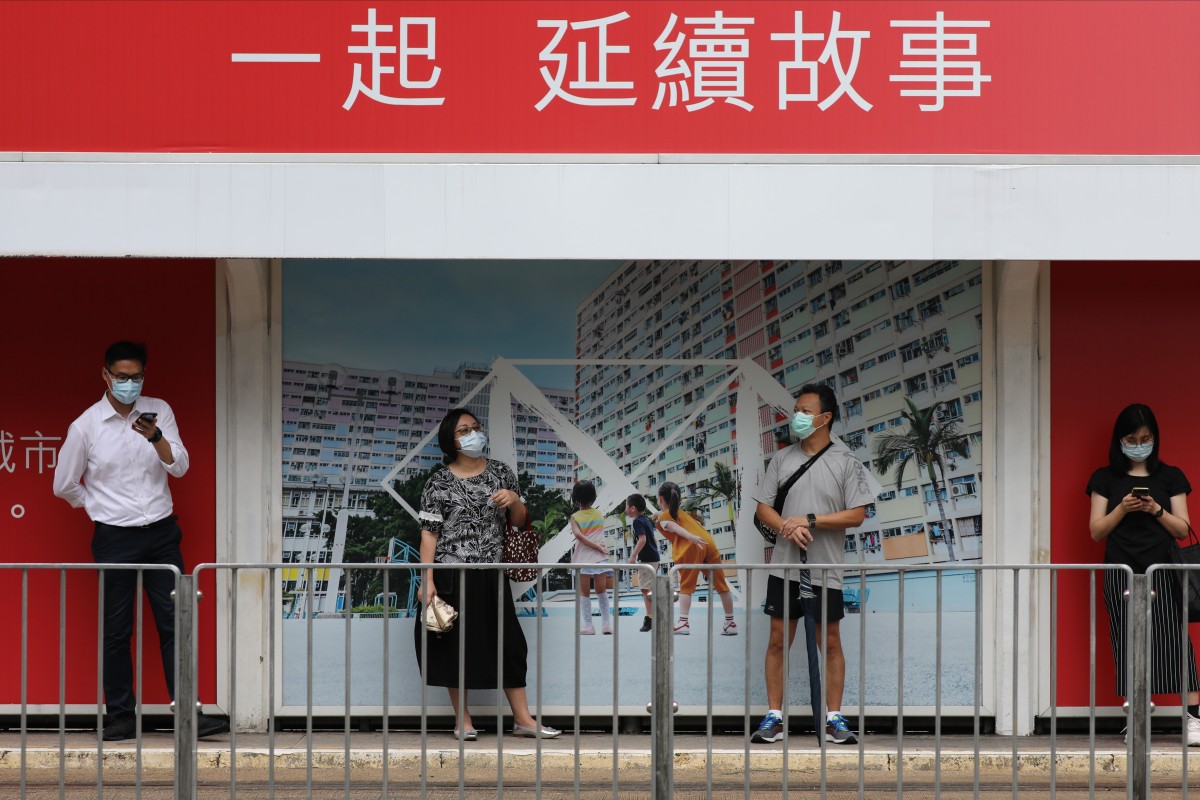In addition to regulatory hurdles and, more recently, the pandemic, HSBC has been caught up in the US-China tussle.
Rumours that the bank may be placed on China’s ‘unreliable entity list’ have done the bank’s stock and its many local investors no favours
HSBC can turn the tide by moving its headquarters to Hong Kong, shaving off non-performing assets and focusing on Asia-Pacific
Albert Cheng Published: 2 Oct, 2020

Hongkongers wait for a tram in front of a HSBC advertisement in Central on September 28. Photo: Nora Tam
HSBC shares have plunged to a record low, falling below the HK$28 per share price during its rights issue during the global financial crisis. While shareholders grieve, for many Hongkongers, the stock’s recent decline indicates the end of the Hong Kong-bred bank’s heydey.
Both the global and local political climate have played a role in HSBC’s downfall. After the 2008 financial crisis, HSBC, which once went global with the vision of being “the world’s local bank”, met its Waterloo in the United States and Europe.
Following the Covid-19 outbreak in March, the US and European Union have tried to boost their economies with monetary easing. The zero-to-negative interest rate policy has severely hurt the profits of the banking sector.
In addition, after moving its headquarters to London, HSBC has had to adhere to the Bank of England’s policies. To offset the financial burden caused by the rapid increase of non-performing loans, banks must retain capital. The Bank of England’s instruction to British financial institutions to suspend dividend payments has put HSBC’s stock price under pressure.
Since the financial crises and the September 11 attacks, Western countries have tightened regulation of the banking sector. HSBC had to separate its investment and retail banking businesses, and also paid billions of dollars to the US regulators to settle money laundering and tax evasion cases.

HSBC sees second-quarter profits plunge by 82 per cent thanks to coronavirus
Today, Hong Kong is caught in the middle of escalating US-China tensions. Given that HSBC is an iconic symbol of Hong Kong as an international financial centre, the bank was unlikely to remain unscathed.
Not only has it been criticised in the West for its dealings with Huawei chief financial officer Meng Wanzhou, in an effort to counter US sanctions, a report in China’s Global Times cited a government source saying HSBC could be listed on an “unreliable entity” list. These developments have done HSBC’s stock no favours.
Huawei to double down on HSBC as Meng Wanzhou’s legal battle intensifies
29 Jul 2020

HSBC has been one of Hong Kong’s most successful brands. It has witnessed Hong Kong’s ups and downs over more than 150 years. Hongkongers are not only proud of HSBC, they are also the biggest contributors to its profits.
HSBC, and its subsidiary Hang Seng Bank, account for the largest number of depositors in Hong Kong. Individuals, companies, charities and Mandatory Provident Fund investment managers have long held HSBC stock for the stable dividends. Many Hongkongers invest their life savings in HSBC stock as part of their retirement plan. Some believe holding tens of thousands of HSBC shares is equivalent to owning a property or a
taxi licence.
In fact, HSBC has an employee share purchase plan, under which the bank matches one share for every three shares an employee holds . It was initially beneficial to employees, which is why thousands of employees have joined the scheme. However, as the company’s stock plummets, employees have suffered losses, impacting morale.
HSBC, as a long-standing Hong Kong brand, in a way, belongs to Hongkongers. However, instead of protecting the bank, Beijing has deliberately spread rumours it could be listed as an unreliable entity. This is extremely damaging not only to the company but also the interests of the general public and various organisations in Hong Kong.
Even more disturbing, Ping An Insurance
has been absorbing HSBC shares during the period, upping its stake in the bank to an 8 per cent shareholding. Although HSBC stock may still drop further, Ping An’s investment could signal to investors that HSBC stock is still desirable, as are Hong Kong’s prospects.
It is not impossible for HSBC to turn the tide. All it has to do is to get rid of the non-performing assets and businesses, and resume paying dividends. HSBC should
move its headquarters back to Hong Kong and focus on the more profitable Asia-Pacific markets, so that it is no longer bound by EU restrictions.
In the face of adversity, Hong Kong and HSBC share the same destiny; as long as one stays hopeful, every day is a new day.
Albert Cheng King-hon is a political commentator

Albert Cheng is the founder of Digital Broadcasting Corporation Hong Kong Limited, a current affairs commentator and columnist. He was formerly a direct elected Hong Kong SAR legislative councillor. Mr Cheng was voted by Time Magazine in 1997 as one of "the 25 most influential people in new Hong Kong" and selected by Business Week in 1998 as one of "the 50 stars of Asia".
HSBC, and its subsidiary Hang Seng Bank, account for the largest number of depositors in Hong Kong. Individuals, companies, charities and Mandatory Provident Fund investment managers have long held HSBC stock for the stable dividends. Many Hongkongers invest their life savings in HSBC stock as part of their retirement plan. Some believe holding tens of thousands of HSBC shares is equivalent to owning a property or a
taxi licence.
In fact, HSBC has an employee share purchase plan, under which the bank matches one share for every three shares an employee holds . It was initially beneficial to employees, which is why thousands of employees have joined the scheme. However, as the company’s stock plummets, employees have suffered losses, impacting morale.
HSBC, as a long-standing Hong Kong brand, in a way, belongs to Hongkongers. However, instead of protecting the bank, Beijing has deliberately spread rumours it could be listed as an unreliable entity. This is extremely damaging not only to the company but also the interests of the general public and various organisations in Hong Kong.
Even more disturbing, Ping An Insurance
has been absorbing HSBC shares during the period, upping its stake in the bank to an 8 per cent shareholding. Although HSBC stock may still drop further, Ping An’s investment could signal to investors that HSBC stock is still desirable, as are Hong Kong’s prospects.
It is not impossible for HSBC to turn the tide. All it has to do is to get rid of the non-performing assets and businesses, and resume paying dividends. HSBC should
move its headquarters back to Hong Kong and focus on the more profitable Asia-Pacific markets, so that it is no longer bound by EU restrictions.
In the face of adversity, Hong Kong and HSBC share the same destiny; as long as one stays hopeful, every day is a new day.
Albert Cheng King-hon is a political commentator

Albert Cheng is the founder of Digital Broadcasting Corporation Hong Kong Limited, a current affairs commentator and columnist. He was formerly a direct elected Hong Kong SAR legislative councillor. Mr Cheng was voted by Time Magazine in 1997 as one of "the 25 most influential people in new Hong Kong" and selected by Business Week in 1998 as one of "the 50 stars of Asia".
No comments:
Post a Comment